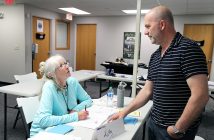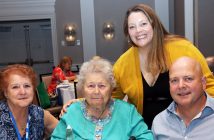MINEOLA — Throughout her 40-year CSEA career, Barbara Jones blazed through two of the union’s toughest trails.
Jones not only shattered the glass ceiling at her workplace — and in leading her union — but she helped lead the way in helping her union’s diversity grow.
She began her career working for Nassau County’s Department of General Services in 1971. At the time, there was a thick glass ceiling in place for minority groups, leading Jones to actively speak out about her displeasure with the status quo.
She was so outspoken that AFSCME Headquarters officials sent a representative to hear Jones’ concerns. During that period, Jones also met Alona Irby, a CSEA member employed at Nassau Community College. “She told me that I needed to stop complaining and do something about the problems,” Jones said.
With that, a union activist was born.
Boosting diversity
To help address diversity issues, Jones started the Nassau County Local’s Unity Committee, on which she is still active.
Jones played a key role in developing several region and local events that celebrate diversity, including the local’s annual Martin Luther King Luncheon. She credits Long Island Region President Nick LaMorte for helping bring her ideas into fruition.
“I got the idea to do the Martin Luther King Luncheon because I noticed that CSEA had award ceremonies for everyone except for people that looked like me,” said Jones.
Shattering the glass ceiling
Jones often had to be her own greatest advocate, which proved especially true when she pursued a career as a computer operator at the county’s Department of General Services to earn more money. At the time, no woman had ever worked in that title.
“They told me that men needed to make more money because they had families to support,” said Jones. “They had all kinds of excuses for not wanting a woman in there.”
Determined to get that job, Jones excelled on the civil service exam for the position, but landing the job still wasn’t easy.
Jones alleges that the computer room supervisor tried to wait for the results of the exam to expire, which would keep her from being the next person in line for the position.
After repeated discussions with unit officers, Jones eventually got a job in the computer department. She was the first woman employed in that department, but not all of her new colleagues were happy to have her there.
“They used to ask me if I wanted to be a man,” said Jones. “I told them, ‘No, I don’t want to be a man. I just want to make more money.’”
Leading the way
Perhaps one of Jones’ greatest accomplishments was becoming president of the local’s Department of General Services Unit, an office she held from 1980 to 1999, when she retired. It was the first time in CSEA’s history that a black woman held the office.
That victory didn’t come without problems. Jones recalls a derogatory message left on her answering machine by an unidentified caller.
“He called me every racist name he could think of,” said Jones. “He said that I had a lot of nerve, that I shouldn’t be an officer. He was really angry.”
Based on her past experiences, the best advice Jones has to offer CSEA’s new activists is to make sure their voices are heard.
“Speak up! What you don’t understand, find out what it means and how it applies to you,” said Jones.
Jones’ motivation for all of her hard work is simple: she wanted to set a precedent.
“I wanted for minorities to see that you have to try,” said Jones. “We don’t want to just pay our dues; we want to be involved.”
— Wendi Bowie




